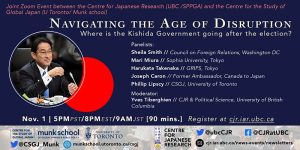Scope Conditions diagnoses democracy’s representation gap with Dr. Sergio Montero
In this episode of Scope Conditions, Professors Alan Jacobs and Yang-Yang Zhou ask: what happens when your favorite candidate isn’t even running? Guest Dr. Sergio Montero argues that, if we want to understand representation, it’s helpful to take a step back from the outcomes voters get and to start thinking about the alternatives available to them.
Prof. Gerald Baier comments on the confidence and supply agreement announced by the Liberals and NDP
According to Professor Gerald Baier, both the parties will have victories and accomplishments they can highlight. “But this (agreement) also has the potential to really hurt the NDP going forward, because voters will think, ‘Why would I vote NDP when the Liberals are doing the kinds of things that the NDP would do?” said Professor Gerald Baier.
Putin’s hard line on gender and sexuality leaves him room to tack to the middle again: Prof Lisa Sundstrom writes
Professor Lisa Sundstrom writes on how Putin’s rhetoric mixes signals to message to both elites and mass audiences. Mixed messages help Putin manage his constituencies’ conflicting expectations and maintain support.
Prof. Kathryn Harrison comments on the changes to the Conservative party’s climate change solutions
“[The Conservatives] are adopting policies that speak on behalf of their core voters, about a third of Canadians who oppose carbon pricing,” said Dr Kathryn Harrison. According to her, conservatives’ aversion is really about the carbon price: “It’s about protecting the status quo and the fossil fuel industry.”
Silencing backbenchers was O’Toole’s downfall, Professor Emeritus Richard Johnston says
“[Erin O’Toole] was bleeding support,” said Johnston. “This is the most brutal ousting and the most sudden, ever.”
Professor Alan Jacobs comments on how identity and values contribute to following COVID-19 restrictions
“My guess is that this is the kind of thing that will be cited by people who are not complying with restrictions, but most of whom perhaps would not have followed the restrictions,” Jacobs said.
Prof. Maxwell Cameron: Don’t ignore democracy’s flaws
We need to ask “What ails democracy?” and work on reversing the erosion of governance before we can promote democracy globally, writes Prof. Maxwell Cameron
Prof. Paul Quirk commented on Biden’s role in the 2024 presidential election
Biden’s age has always been a cause for concern. UBC political science professor Dr. Paul Quirk says if Biden’s “senior moments” don’t become noticeably more frequent or more alarming over the next two years, he will probably run for a second term. “If the economy is in a strong recovery and the pandemic is behind us, he should have excellent prospects in the election, and there won’t be a strong argument that any alternative nominee would be more electable,” he added.
Watch: Navigating the Age of Disruption: Where is Japan Going After the Election?
In this event hosted by the SPPGA and moderated by UBC Political Science Professor Yves Tiberghien, panelists discuss the result of the Oct 31, 2021 election of the House of Commons in Japan.
Prof. Carey Doberstein wins Policy & Society 2020 Best Paper Award
Doberstein’s co-authored article, “Understanding inclusion in collaborative governance: a mixed methods approach,” proposes a conceptual model to shape the empirical analysis of what contributes to inclusion in collaborative processes









